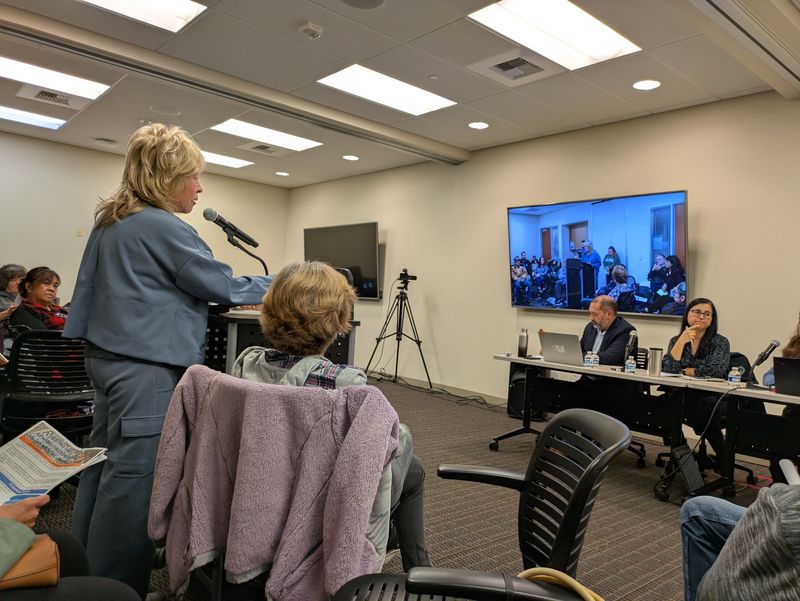A proposed 24-hour residential treatment facility for adults with serious mental illness is drawing concerns from Salinas residents who live near the planned site.
The 96-bed Mental Health Rehabilitation Center (MHRC) is proposed by the Monterey County Health Department’s Behavioral Health Bureau (BHB) for a vacant lot on Constitution Boulevard across from the Salinas Regional Soccer Complex.

The estimated $173 million project consists of six new 16-bed buildings for adults 18 and over with serious mental illness and/or co-occurring substance use disorders who are under court appointed LPS (Lanterman-Petris-Short Act of 1967) conservatorship.
Early design concepts include secure, peaceful outdoor spaces, an open, natural light design that blends with the community and walking trails.
“While there are some limitations to changes due to required building footprints, spacing, and other considerations, we welcome feedback, and can request that architects incorporate suggestions into future drafts,” said Melanie Rhodes, Monterey County Behavioral Health Bureau chief.
As part of the project’s community engagement process, the county has undertaken a series of listening sessions so the public can learn more about the project and voice their concerns before the Behavioral Health Bureau makes their presentation to the Monterey County Board of Supervisors on Dec. 9.
The next listening session is at 10 a.m. on Saturday, Dec. 6 in the Whitney Conference Room at 1270 Natividad Road, Salinas.
‘This is my backyard’
At the Nov. 17 listening session, residents from the surrounding neighborhood raised concerns about the facility’s high cost and proposed location, citing its proximity to homes, schools and the nearby soccer complex.
“That is my walking path,” said Creekbridge resident Nina Perez as she pointed to a path next to the facility on a county-provided rendering of the project. “This is my backyard.”
Neighbors were concerned the facility would exacerbate a community already on the brink, with residents sharing stories of people living on the streets loitering in the creek and inmates recently released from the county jail leaving remnants of their go-bags along city streets.
Residents were fearful of patients in crisis should they leave the 24-hour secure facility and left to wander the street.
“We already have three boarding care homes in my neighborhood, so we see people that have challenges dealing with everyday life, now you are saying we are going to be taking people from Napa and Atascadero?” said Leticia Gomez.
A ‘service desert’
County officials say the Central Coast is a “service desert” for the kind of intensive treatment planned at the Salinas facility, which is why it will also serve eligible clients from outside the county.
As of November 2025, county officials estimate that 29 Monterey County residents could immediately benefit from the proposed facility. Currently, about 122 people in the county are under LPS conservatorship.
“But this number is not static, new clients can escalate to this level of need, and clients do improve and return to their homes and families to lead normal lives in the community,” said Rhodes.
Currently, Monterey County residents who are under LPS conservatorship are placed in facilities outside the county.
“Our team travels to meet with them and their treatment providers regularly at their out of county placements and when their treatment goals are met, we work closely with the public guardian/conservator office to transition them back to the community or to another appropriate level of care placement as clinically indicated in our county,” explained Rhodes. “They do not remain in that other county.”
When asked how likely it would be for out-of-county clients at the proposed Salinas facility to stay in Monterey County to continue to receive services, say at a lower level of care? Rhodes said, “not likely.”
“Not likely as these individuals would be under an LPS conservatorship in that other county and that county would be responsible for transitioning them back to their county of origin as their treatment goals are met,” said Rhodes.
A client’s average length of stay at an MHRC is 285 days, according to a 2021 RAND report presented by the Behavior Health Bureau.
While every client’s situation may be different, their stay at the Salinas facility will likely be funded through a “combination of Medi-Cal and 1991 Realignment dollars,” said Rhodes.
Initial model estimates approximately $3.7 million in savings to keep Monterey County clients in the Salinas facility rather than in a facility in another part of the state, said Rhodes, while fiscal model estimates approximately $4.9 million in new revenues for the county.
Rising project costs
In June 2023, the Behavior Health Bureau was conditionally awarded a $20,166,779 grant to renovate the old Rehabilitation wing of the county jail for the proposed MHRC, but in February 2024, the bureau was notified by the sheriff’s office that it was no longer available.
The jail site is now being used for inmate services including a laundry and re-entry programs.
The project then transitioned to a county-owned parcel that was identified in 2018 by the Board of Supervisors for future health care facilities, said Rhodes.
The parcel was “identified and selected due to its close proximity to other county health services, zoning and land use compatibility with county plans, and its adequate space to accommodate six 16-bed MHRC buildings and related infrastructure,” said Rhodes.
Due to the parcel having no essential infrastructure (power, sewer, water, data connections), increased construction costs, rising tariff rates, the project cost ballooned from $45 million when it was a renovation project to an engineer estimate of nearly $173 million.
Financing will come from a mix of grants and roughly $54 million in debt service presented to the Board of Supervisors in November 2024. There remains a funding gap of over $63 million.
This article originally appeared on Salinas Californian: Neighbors push back against proposed mental health facility in Salinas
Reporting by Roseann Cattani, Salinas Californian / Salinas Californian
USA TODAY Network via Reuters Connect


